YOUR BROWSER IS OUT-OF-DATE.
We have detected that you are using an outdated browser. Our service may not work properly for you. We recommend upgrading or switching to another browser.
Date: 31.01.2021 Category: general news
Almost six months have passed since Prof. Arkadiusz Wójs became Rector of Wrocław University of Science and Technology. What surprised him most during this time? What challenges does the university face? Will he be vaccinated for COVID-19?
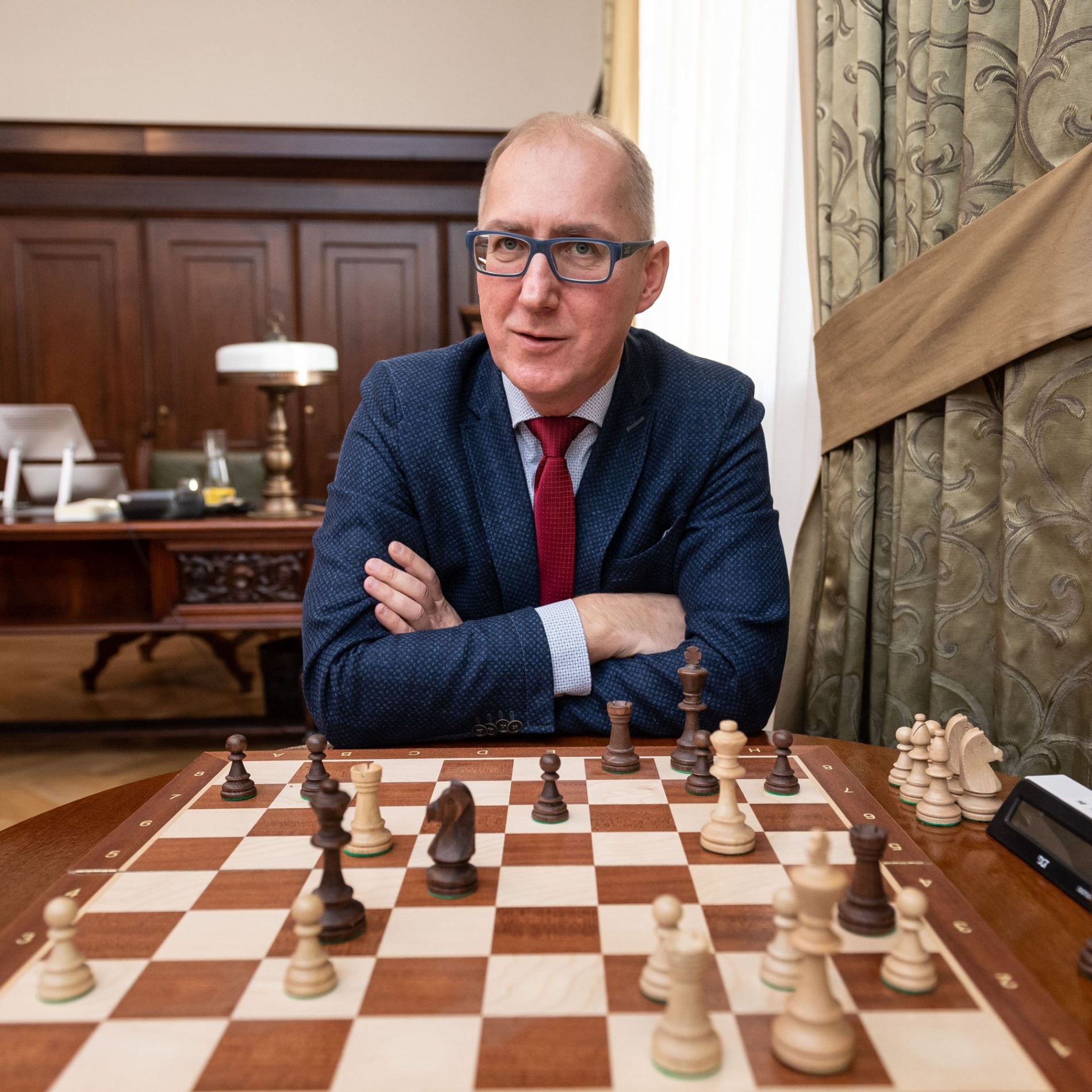
Iwona Szajner, Michał Ciepielski: You have chess pieces laid out on your table and you can see that it’s probably near the endgame. Have you been playing someone?
Prof. Arkadiusz Wójs: This is a position from one of the most famous chess games in history, played during a strong chess tournament held in Wrocław in 1912. Stepan Levitsky played white Frank Marshall played black. The pieces on the chessboard represent the situation just before white surrendered after black’s phenomenal move with the queen. I played chess from mid-primary school until comprehensive school and took part in inter-school tournaments. Now, as time is scarce, I only play on my phone.
Almost six months have passed since the term of office began. Have you settled in enough to go straight to the Rector's office after you enter the building, or do you still sometimes find yourself climbing the stairs and heading towards the W-11 Dean's office?
I find it a little sad, but I already remember less and less what it was like when I would climb those stairs. When I sometimes drop in the W-11 Dean's office, I already feel a bit strange, quite unlike an employee of my department or faculty. This is due to my strong focus on a single, specific issue, which probably isn’t a good trait. It was the same when I worked in Cambridge. I bonded strongly with that place and the wonderful people there. I thought I’d often go back to them, to attend seminars, for instance, and I have only flown there a couple of times.
Now it would be difficult to get there anyway. Due to the pandemic, air traffic has been severely restricted, but perhaps things will return to normal with the start of the vaccination programme. Have you signed up yet?
I want to get vaccinated on the first possible date, but I haven't signed up yet. My age group will probably end up at the end of the line anyway.
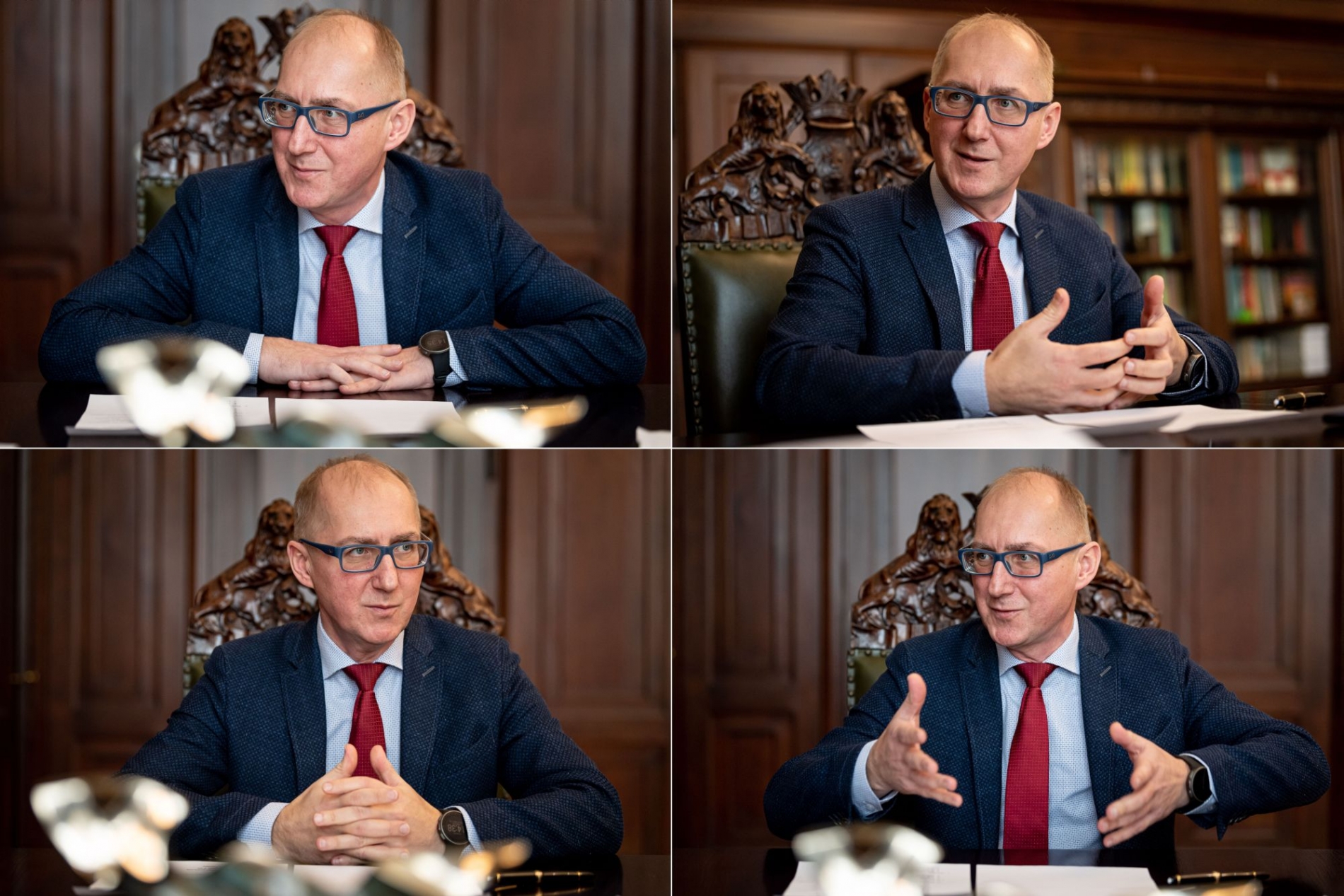 And has a decision been made yet on when vaccinations of the university staff will start and what the procedure will look like?
And has a decision been made yet on when vaccinations of the university staff will start and what the procedure will look like?
There are several issues at play here. One of these is whether we can convince the ministry that all university employees – teachers, doctoral students, administrative staff – should be treated in the same way. The Conference of Rectors of Academic Schools in Poland has issued a letter on this issue, in which we call for refraining from creating separate groups with the right to early vaccination, as this is illogical. We all share the same risks, and we can’t make the teachers alone participate in education. Will we let the students in, and tell the PhD students and administrative staff to come back to the university in six months? We can’t operate like this. It's also, in a way, about solidarity, so we feel good with each other as a group.
We live in “interesting times”, so a lot has happened in these few months. What has been your personal experience of this time? Has anything particularly disappointed or positively surprised you?
Let me start with the disappointments. These are primarily pandemic-related events. They’re so overwhelming that they actually overshadow everything else. The very fact that there are no students at the campus completely changes the atmosphere. Our work is supposed to give a lot of joy and a strong sense of meaning, and this is closely linked to the interaction with the students. We’re losing it. The longer this situation goes on, the more I realise that such disaccustoming ourselves from normality begins to have lasting negative effects. Long-term isolation changes people and the relationships between them. What worries me is whether trust and cordiality will have to be learned all over again.
Another problem, a huge one, is that students are not really in touch with the academic world. Their time at university is often their only chance to see what the world of science and work at university are like. It’s extremely important for society as a whole to respect knowledge, and people in high positions must have the opportunity to learn what is a university, a place where you work not for profit but in search of the truth.
Also, students are deprived of contact with each other...
This is true. Relationships started during the course of study should be long-lasting and remain so even after graduation, if only in the form of phone numbers you keep. Young people communicate with each other, they learn a lot from each other but remotely, in most cases. They don't go to rallies, they don't hang out at the campus or Student Culture Zone, they can't meet as often as they used to. It’s more difficult to build relationships in such conditions.
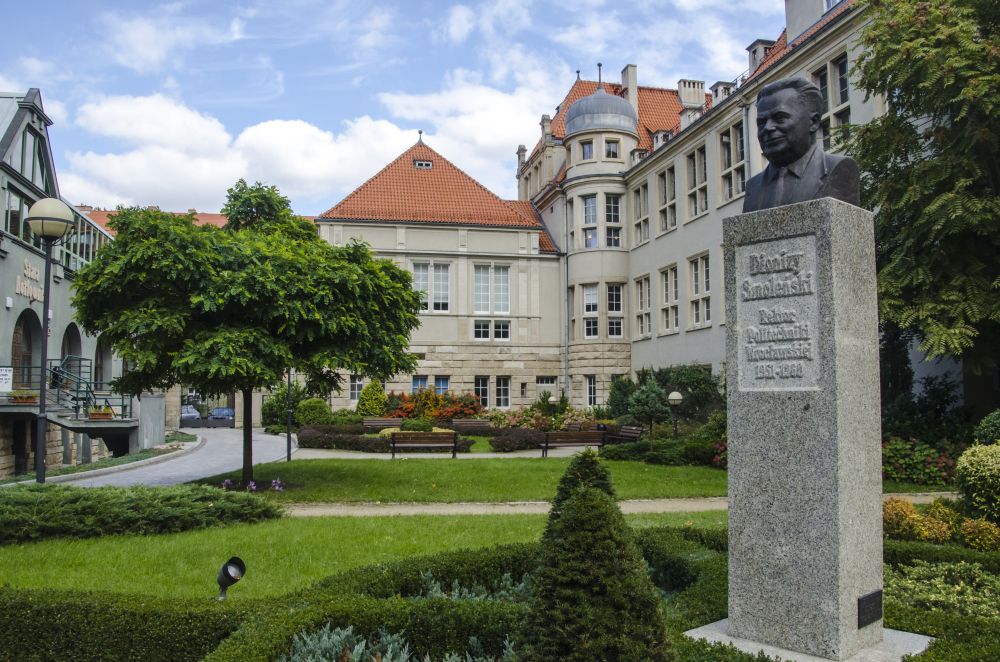 So when do we return to the university?
So when do we return to the university?
It’s very hard for me to say this out loud. I don't know. Not soon. Probably not this semester. Just a few days ago, it seemed that – as the number of cases of the disease remains stable, far from the peak level - it would be possible in April, perhaps in May. Today, we already know that new mutations have emerged and are slowly wreaking havoc in more and more countries, with experts predicting that a third wave of the coronavirus is inevitable. So, in order not to surprise the teachers and students with a decision about the mode of teaching at the last moment, first announcing the return to the university and then cancelling it and sending people back home, the summer semester will be conducted entirely in the remote mode. If the University of Cambridge has taken such a decision and has been educating its students only online for a year, then we, too, should show courage and responsibility for our entire community, even if we realise the shortcomings of this model. We’re all bearing the cost of the pandemic: from entrepreneurs to artists; universities are no exception.
What else has been hampered by the pandemic?
It has put the brakes on many initiatives and ideas. Let’s look at the field of teaching – now we’re all busy coping with the current difficult and changing situation, to some extent at the expense of failing to come up with new solutions for a future time after the pandemic. I wanted to modernise the didactics. It might seem that the pandemic could accelerate this process. But the trigger to implement the change was there anyway, and now a lot of time and energy is taken up with current affairs... It’s the same with student activities. I announced the opening of the Student Culture Zone, the organisation of events on WUST's boulevard, the beginning of cooperation with the Opera and the National Forum of Music, our students’ involvement in the Green University, but everything was closed down. We opened a sports facility in September, and now it remains empty. We've been dreaming of our university becoming truly student-centric for too long, so it's hugely disappointing that we can't translate it into reality now.
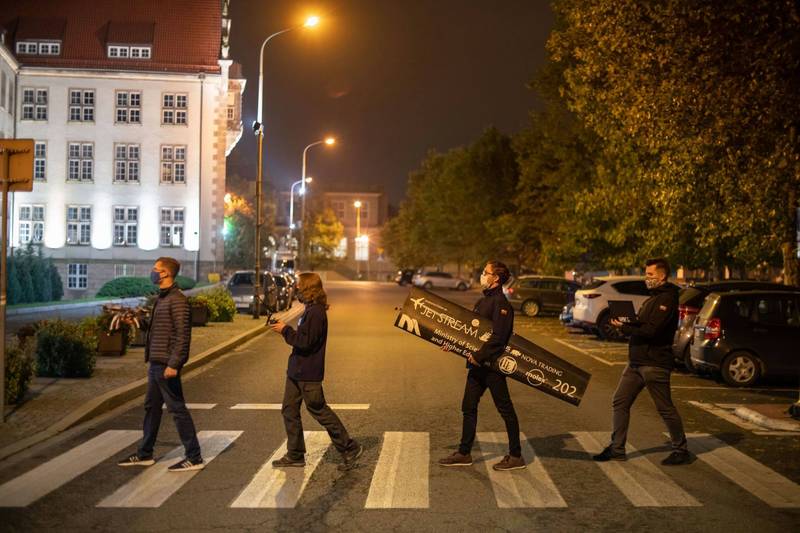 And what, in contrast, has been a positive surprise?
And what, in contrast, has been a positive surprise?
Everything to do with people. I had my hopes up at the beginning of my term of office, but I am getting more than I expected: enormous enthusiasm, ideas, and commitment. It's amazing and incredibly uplifting, and it's also new to me because I've never worked with so many groups of people before. I am very positively surprised by the effectiveness and commitment of the Vice-Rectors. Much of the recent months’ success owes to their activity.
We have managed to learn remote teaching. As a result of the highly commendable commitment and responsibility of the academic staff, we’ve launched the incentive programmes Primus, Secundus, and Tertius, which have been very well received as well as giving active young researchers a genuine sense of self-worth. A small amendment to the statute has been adopted, in which my priority was to rebuild the faculty structure, but I also have high hopes for recognising outstanding active professors with the status of professor magnus. We have also managed to turn around the Manus Foundation and sustain the activity of the SCZ.
Also, there’s excellent cooperation with the Deans, who, I feel, have already formed a team. They’re communicating with each other, meeting, and arranging things. Once a fortnight, we all meet at the college meetings. I’m grateful for the way we work together and our relationship. I’m proud of WUST’s Deans.
I’m also in regular contact with the University Council, the chairs of the science discipline councils, the Presidium of the Senate, and the heads of all key administrative units. I’m happy that so many people are putting forward new ideas, which results, among other things, in the establishment of new science centres. For example, the recently established the Climate Centre – it was the current director who brought the idea and vision; she convinced us that it was worth founding.
I’m talking to our employees a lot and it sometimes happens that conversations start with resentment and then it turns out that it’s just an excuse to put forward ideas. Importantly, many of these suggestions have been put into practice. Another positive aspect is the cooperation with trade unions. Many people have told me that they’re a difficult partner, and yet... We’re on good terms. The trade union representatives are competent, well-prepared, and helpful. There’s also support from the former rectors, who are very committed to the university’s life, providing us with advice on a great many issues. Also, I know I can count on them as far as moral support is concerned when some difficult decisions arise, although they are sometimes critical. In this respect, Wrocław University of Science and Technology is unique.
Regrettably, due to the pandemic, there’s too little relationship with the students’ self-governing union and the doctoral council, and it’s them that I expected most ideas to come from. I very much look forward to going back to those meetings.
And have you surprised yourself in any respect?
Although I’ve always been a workaholic, I’ve never yet worked at such a pace and I’ve never been so stressed out and tired. With this feeling that certain things can’t be done later, in less haste, after much longer thinking or picking enough brains. I've only read about it so far, but I feel that the constant tension is also changing my perception of the world a bit, and of people in particular. Thankfully, the people around me are very understanding. We promise each other that things will be normal one day, and I think they forgive me my impatience or just mistakes. I’m grateful for that.
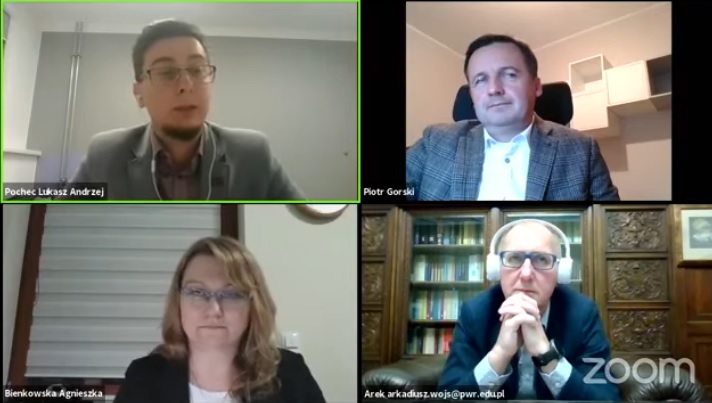 As announced, online meetings between university authorities and the academic community have started. What do you make of them?
As announced, online meetings between university authorities and the academic community have started. What do you make of them?
There have been too few of these. So far, they have taken the form of one-way communication, where we provide information rather than discuss things. Meetings are complemented by e-mails or questions sent on Facebook, but I also want to create a system of communication between staff members bypassing the Rector. A system whereby important topics are discussed, such as the role of the faculty council and the discipline council, the independence and cooperation of faculties or where and on what scale it would be good to implement good corporate practices. The "WUST talks" tab is a small substitute for such a forum.
While we’re on the subject, there have been several voices on the appointment of Professor Karolina Jaklewicz as the Rector's Plenipotentiary for Anti-Discrimination. Did you expect this nomination to generate such a stir?
I don’t regret this decision. We’re a European university, and equality and respect for some kind of openness is a process that is now developing at universities across Europe. I’m saddened by the amount of distress experienced by Professor Jaklewicz. I feel the responsibility because she is, after all, my plenipotentiary, but I know that she’s been successfully coping with it and I admire her for that. When appointing her to this role, I asked her to draw up a diagnosis on how to improve the situation at the university in terms of various sorts of discrimination. Gender is one thing, but age, for example, is an equally important subject. I trust that thanks to her work WUST will keep improving as a university, not only in terms of the number of research papers or patents. I would also like to add that just a few days ago, I appointed the Rector's Plenipotentiary for Anti-Corruption at WUST, on whom I also pin high hopes.
There’s yet another issue that, as a university operating in an EU country, we need to tackle. If we want to take part in European scientific projects, we have an obligation to prepare systemic solutions related to equality policy. Some universities, such as the University of Warsaw, have already outstripped us in this respect. The equality policy team recently established at our university has about a year to develop relevant documents.
In terms of development, internationalisation and research, do you think that the pandemic period has been a wasted time for universities?
Far from it. Paradoxically, when there are no students and no ceremonies or celebrations during the academic year, you can prepare for better times, i.e., for instance, improve the structure and organisation of the university, carry out renovation projects, develop new teaching formats, or a new way of financing the University. Now there is more time for such activities, and time is always in short supply.
When it comes to internationalisation, we face several challenges. We plan to conduct all classes at the Doctoral School in English and expand international cooperation in terms of teaching delivered by foreign lecturers. We also want to establish tangible cooperation with nearby European universities, which seem to be our natural partners as far as development is concerned.
As for research, it’s carried out all the time, of course, although indeed more remotely in some cases. However, it’s noteworthy that, despite the pandemic, workers from abroad are coming to us. We’re becoming attractive to them as a result of, among other things, nationwide programmes funded by the National Academic Exchange Agency (NAWA). We recently reported that a scientist from Venezuela would be starting research at W-11, but we have many more such guests at the university. This trend is now on the increase, and I hope that it’ll soon accelerate strongly. It’s for this reason that we’re preparing to create a place where scientists coming for a long time can stay. As I expect foreign professors’ permanent presence at WUST, the conditions in this "University’s guest house", as it were, will be slightly better than in the halls of residence, which, by the way, won’t stop improving either.
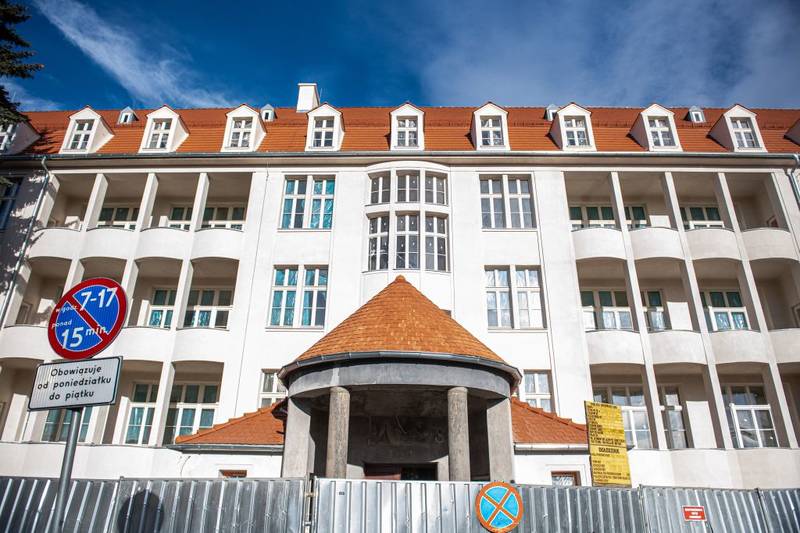 The opening of the “guest house” is not the only idea for the expansion of the campus. Despite the difficult conditions, the university already has several other major construction and renovation projects planned.
The opening of the “guest house” is not the only idea for the expansion of the campus. Despite the difficult conditions, the university already has several other major construction and renovation projects planned.
We’ve successfully selected a contractor for the renovation of the C-7 building. In terms of cost, it will probably be one of this term’s biggest investments. Soon, we will also start the construction of the Wrocław Digital Factory in Na Grobli Street. We’re waiting for the commissioning of the former hospital facilities in Hoene-Wrońskiego Street, which will house the Faculty of Mathematics. It’ll be a big event for the university, as it’s both a beautiful building and an excellent faculty. We plan to renovate the halls of residence and create a long-awaited prototyping facility for the Faculty of Architecture. Moreover, we’re working on a concept for a swimming pool, which will be another stage in the development of our sports infrastructure.
And apart from the new investments, what other challenges are ahead of us in 2021?
Certainly, expanding cooperation with Wrocław’s universities. It’ll also be a challenge to develop a major statute amendment and university strategy, as well as identify priority research areas.
One of the serious tasks will be the establishment of the Faculty of Computer Science and Telecommunications – and this is because the goal is not just to found some new faculty, but to develop WUST towards the great expectations of our students and Wrocław's hi-tech employers. Related to this is the incorporation of the College of Humanities into the current Faculty of Computer Science and Management, which is intended not only to justify the conduct of research by our humanities specialists but also to facilitate the expansion of our university into the social sciences and humanities, in line with the needs of a modern technical university.
Perhaps the biggest challenge that WUST is now facing is digitisation, so we are acting with great momentum in this field. This is an ongoing process, and our backwardness, although it hurts today, also allows us to implement many modern solutions at the same time.
Can you provide any specific examples?
A digital warehouse, providing access to an enormous amount of information about the university not only to people at different levels of management but also to IT tools (artificial intelligence), will be the basis for optimising many processes.
I expect, for example, that decisions on the launch of a new course will be based on more data, that timetabling will be simpler, and that the annoying empty parking spaces will disappear. We started the computerisation with several adjustments and spot improvements, preparing the transition to the Dean’s new e-offices system as well as implementing a unified e-mail system offering a wide package of services. What lies ahead is an electronic document circulation system, but also a modern website with an intranet or a discussion forum. A business intelligence system is being implemented – I’m already using it and the Deans will any week now.
I also consider it a priority to professionalise the management of tasks related to WUST's mission, i.e. education, research, etc. I hope that we can already see improvements in various areas of administration, but this is also a process requiring not only knowledge but also patience and communication. Also, I have high expectations of reinstating the role of the chief financial officer at the university.
However, it will be important to fine-tune the system of financing the faculties and departments, as it should combine elements of competition and cooperation, bringing management down to the lowest possible level of the structure, but at the same time taking into account the diversity of the areas that make up WUST. On the other hand, the system of incentive programmes (Primus, Secundus, and Tertius), will be complemented by WUST’s Centre for Scientific Excellence.
What do you think will be the test of the changes you have introduced at the University?
First of all, in 2022 we will face the evaluation of our scientific activity for the period 2017-2021. If we lose academic credentials in any of our indigenous disciplines, it will mean that we have failed to take flight and some ambitious plans will have to be reviewed. But if we at least maintain the status quo versus the rapidly growing competition, the path to the "Great University of Technology" is open before us. I wouldn’t be working like I was crazy today if I didn’t believe in this optimistic scenario. And since research is conducted by scientists at the departments, my optimism is an expression of confidence in the strength of WUST’s staff as well as trust in the heads of the departments.
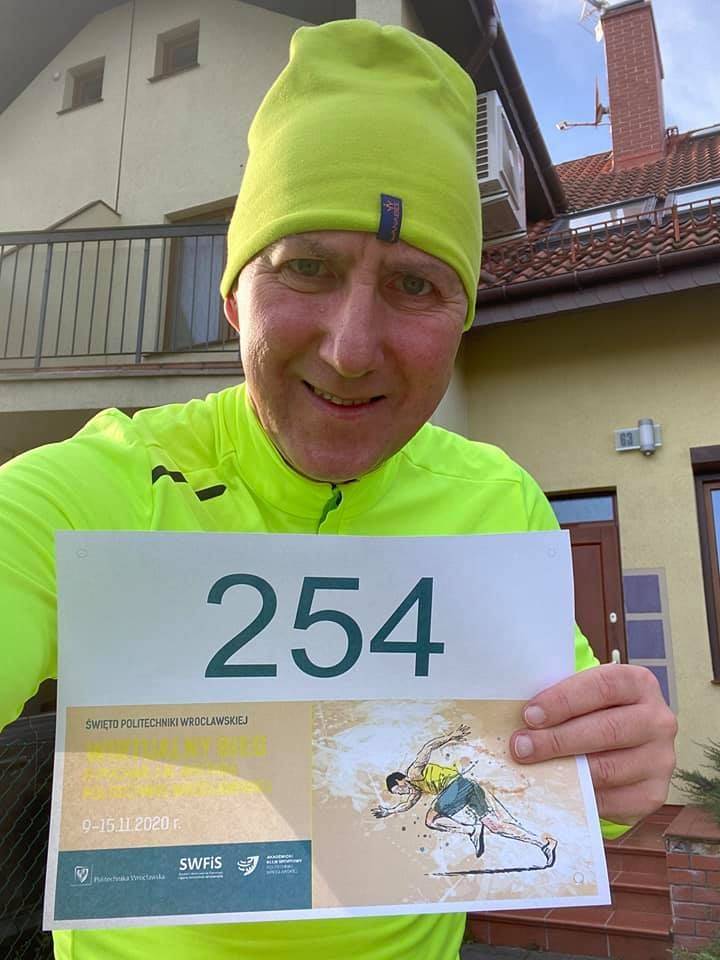 Another test for us is financial stability, both globally and in individual units. A stable financial standing is a basis for development, so especially in difficult times, the university's policy in this area must be conducted competently, at a level appropriate for an organisation employing five thousand people and with a budget of around a billion zlotys. The level of investment, particularly in people, will undoubtedly be a test of our effectiveness.
Another test for us is financial stability, both globally and in individual units. A stable financial standing is a basis for development, so especially in difficult times, the university's policy in this area must be conducted competently, at a level appropriate for an organisation employing five thousand people and with a budget of around a billion zlotys. The level of investment, particularly in people, will undoubtedly be a test of our effectiveness.
Finally, a more private question. You are a very active person. Before the pandemic, you played tennis, ran, and swam. How are you coping now that everything‘s closed?
I have a gym at home and I can still run or walk my dog. I used to do sports because I enjoyed it; now, with the big mental strain, I also find it to be a sort of life hygiene. Without physical exercise, it’s impossible to hold out in the long run. So let's just say that I also do it for the sake of my co-workers – so they can put up with me. That's why I must do some of this weight-lifting at home.
Our site uses cookies. By continuing to browse the site you agree to our use of cookies in accordance with current browser settings. You can change at any time.